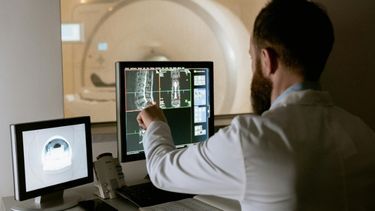
Radiographer
Radiographer
As a Diagnostic Radiographer, you will operate the latest imaging technology to diagnose illnesses and injuries to ensure patients receive the correct treatment.
You will be confident using the following specialist techniques:
- Angiography
- Computerised Tomography (CT)
- Fluoroscopy
- MRI (magnetic resonance imaging)
- Ultrasound and X-ray
Once you graduate, you will have the clinical experience to work in hospitals, operating theatres, outpatient clinics, or accident and emergency departments (A&E).
Necessary qualifications and skills
To work as a Diagnostic Radiographer in Scotland, you will need an undergraduate degree in Diagnostic Radiography that is accredited by the Health and Care Professions Council (HCPC).
Foundation Health SciencesResponsibilities
- conduct radiographic examinations
- produce high-quality images
- assess illnesses or injuries of each patient
- follow safety regulations before using medical equipment
- assist the doctor or surgeon with complex radiological investigations
- adhere to UK radiation legislation
Personal qualities that will help you become a domestic radiographer
- leadership skills
- caring and compassionate
- good time-management
- organisational skills
- problem-solving and critical thinking skills
Page Section
Working hours
Your standard working week will be around 37.5 hours and may include a mix of shifts, such as nights, early starts, evenings and weekends.
Salary
The starting NHS salary for a newly qualified radiographer is approx. £27,055 (Band 5) and can increase to £32,934. Experienced radiographers can earn £33,706 – £40,588 (Band 6). Advanced practice, management roles, and consultants can earn a lot more.
Career prospects
You can work your way through the NHS grading structure in both clinical and management roles. Alternatively, you can choose to work within education or in agencies or charities, looking at issues such as quality assurance or patient care, information and support services.